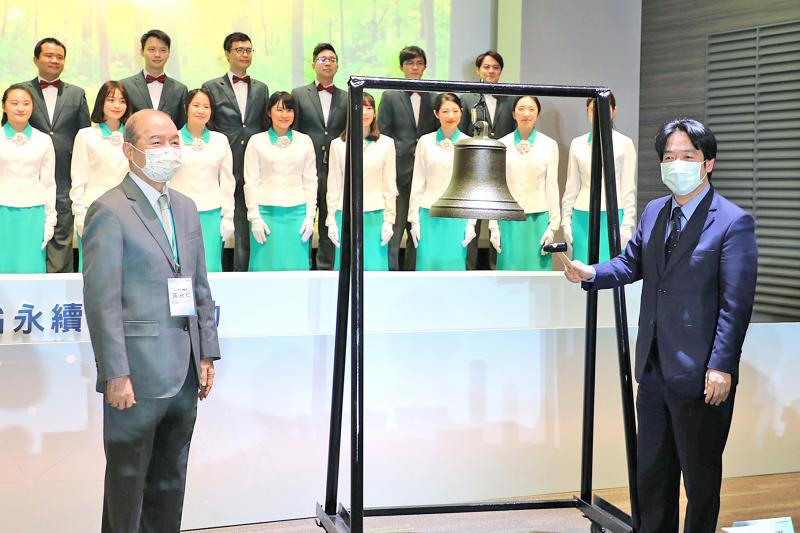E.Sun Commercial Bank (玉山銀行) on Friday launched its “E.Sun ESG and sustainability initiative” in a ceremony in Taipei, with Vice President William Lai (賴清德) and Vice Premier Shen Jong-chin (沈榮津) attending the event to express their good wishes.
E.Sun Bank founder Huang Yung-jen (黃永仁), chairman Joseph Huang (黃男州) and the leaders of 32 Taiwanese companies, including delegates from China Steel Corp (中鋼) and AU Optronics Corp (友達光電), signed the initiative’s Sustainable Development Advocacy.
E.Sun and the companies pledged to incorporate environmental, social and governance (ESG) factors into their business, and implement the UN Sustainable Development Goals. They also committed to taking action against the most urgent climate change issues.

Photo courtesy of E.Sun Commercial Bank
The initiative has gathered companies that demonstrated leadership in sustainable development. All participants committed to taking positive environmental action to reduce greenhouse gas emissions and reduce the impact on the environment.
Through the initiative, it is expected that Taiwan’s industry would pay more attention to ESG factors and sustainability.
Lai was the first to express his appreciation to E.Sun for its contribution to culture, art, sports, education and care for the disadvantaged.
Lai said that the initiative represents three main points.
First, it is an action taken by E.Sun and companies autonomously to combat climate change; second, it is the perfect time to respond to the international trend and to meet the goal of carbon emission reduction; and third, the action can drive the government to adopt better climate change policies.
“With joint effort of the companies, ESG will become the pride of Taiwan,” Lai said.
Shen said he hopes that the initiative can be a milestone for companies to view ESG as part of their DNA, making positive changes to society and the environment, and “building our country into a more sustainable and resilient place.”
“It is very encouraging to improve ESG practices with companies that embrace the same value,” Joseph Huang said. “We can work together to make the environment and the world better.”
E.Sun has been listed in the Dow Jones Sustainability Index for seven years in a row, setting a record for firms in Taiwan’s financial sector.
The bank is also leading its peers in introducing the Equator Principles, “green” bonds and ESG-linked loans.
E.Sun is a long-term supporter of renewable energy establishment. In 2019, the bank took the lead to terminate financing to coal-fired power plants, a pioneering action that could reduce negative effects of high ESG-risk business activities.
E.Sun will continue to improve its management and practices of ESG. By pledging to the “E.Sun ESG and Sustainability Initiative,” the bank wishes to promote the idea together with Taiwanese companies that share the same vision.
E.Sun hopes to make positive contributions and raise awareness in the Taiwanese industry by addressing ESG issues and pursuing sustainable development.

When Lika Megreladze was a child, life in her native western Georgian region of Guria revolved around tea. Her mother worked for decades as a scientist at the Soviet Union’s Institute of Tea and Subtropical Crops in the village of Anaseuli, Georgia, perfecting cultivation methods for a Georgian tea industry that supplied the bulk of the vast communist state’s brews. “When I was a child, this was only my mum’s workplace. Only later I realized that it was something big,” she said. Now, the institute lies abandoned. Yellowed papers are strewn around its decaying corridors, and a statue of Soviet founder Vladimir Lenin

UNIFYING OPPOSITION: Numerous companies have registered complaints over the potential levies, bringing together rival automakers in voicing their reservations US President Donald Trump is readying plans for industry-specific tariffs to kick in alongside his country-by-country duties in two weeks, ramping up his push to reshape the US’ standing in the global trading system by penalizing purchases from abroad. Administration officials could release details of Trump’s planned 50 percent duty on copper in the days before they are set to take effect on Friday next week, a person familiar with the matter said. That is the same date Trump’s “reciprocal” levies on products from more than 100 nations are slated to begin. Trump on Tuesday said that he is likely to impose tariffs

HELPING HAND: Approving the sale of H20s could give China the edge it needs to capture market share and become the global standard, a US representative said The US President Donald Trump administration’s decision allowing Nvidia Corp to resume shipments of its H20 artificial intelligence (AI) chips to China risks bolstering Beijing’s military capabilities and expanding its capacity to compete with the US, the head of the US House Select Committee on Strategic Competition Between the United States and the Chinese Communist Party said. “The H20, which is a cost-effective and powerful AI inference chip, far surpasses China’s indigenous capability and would therefore provide a substantial increase to China’s AI development,” committee chairman John Moolenaar, a Michigan Republican, said on Friday in a letter to US Secretary of

ELECTRONICS BOOST: A predicted surge in exports would likely be driven by ICT products, exports of which have soared 84.7 percent from a year earlier, DBS said DBS Bank Ltd (星展銀行) yesterday raised its GDP growth forecast for Taiwan this year to 4 percent from 3 percent, citing robust demand for artificial intelligence (AI)-related exports and accelerated shipment activity, which are expected to offset potential headwinds from US tariffs. “Our GDP growth forecast for 2025 is revised up to 4 percent from 3 percent to reflect front-loaded exports and strong AI demand,” Singapore-based DBS senior economist Ma Tieying (馬鐵英) said in an online briefing. Taiwan’s second-quarter performance beat expectations, with GDP growth likely surpassing 5 percent, driven by a 34.1 percent year-on-year increase in exports, Ma said, citing government